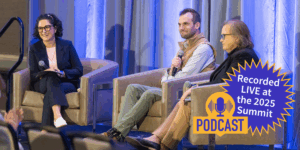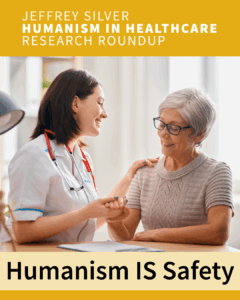 The Jeffrey Silver Humanism in Healthcare Research Roundup features summaries of recently published studies on humanism in healthcare. To receive email notification of new studies once per month, enter your information here and select “Jeffrey Silver Research Roundup” from the checkboxes at the bottom. See previous posts in this series.
The Jeffrey Silver Humanism in Healthcare Research Roundup features summaries of recently published studies on humanism in healthcare. To receive email notification of new studies once per month, enter your information here and select “Jeffrey Silver Research Roundup” from the checkboxes at the bottom. See previous posts in this series.
Publications from Gold-Affiliated Authors
Estimating the Attributable Cost of Physician Burnout in the United States Han S, Shanafelt TD, Sinsky CA, Awad KM, Dyrbye LN, Fiscus LC, Trockel M, Goh J. Ann Intern Med. 2019 May 28. doi: 10.7326/M18-1422.
Drs. Tait Shanafelt and Lotte Dyrbye are Mapping the Landscape grantees.
Burnout is a widespread occupational condition characterized by emotional exhaustion, detachment from work, and a sense of low personal accomplishment. By one estimate, half of all physicians have at least one of these characteristics. While new research demonstrates that the personal costs of burnout are staggering, less is known about the cost of burnout to the U.S. economy. In order to better estimate these costs, Shasha Han and colleagues performed a cost-consequence analysis using a simulated population of U.S. physicians. Through a complex mathematical model, they determined that about $4.6 billion dollars are lost due to burnout. This represents a loss of $7,600 per employed physician per year. However, even this may be an understatement, as the authors were unable to incorporate lower overall quality of patient care, reduced patient satisfaction, malpractice lawsuits, and other variables that are difficult to quantify. Regardless, this data provides an important impetus to organizations to mitigate burnout.
Where is the family voice? Examining the relational dimensions of the family-healthcare professional and its perceived impact on patient care outcomes in mental health and addictions Free full text Soklaridis S, McCann M, Waller-Vintar J, Johnson A, Wiljer D. PLoS One. 2019 Apr 12;14(4):e0215071.
Dr. Sophie Soklaridis is a Mapping the Landscape Grantee.
Mental health conditions are devastating, widespread, and challenging to treat. One aspect of these conditions is the lack of relationship-centered care incorporating family and other support systems. Using a qualitative methodology, Sophie Soklardis and colleagues examined how to include family members in the care of patients with mental health disorders, including addiction. As part of their study, they conducted semi-structured interviews with 21 family members, most of whom were mothers. These questions centered on the family’s perceived role in patient care and resources/structures that support families. Ultimately, four themes were identified, including the relationships between the family member and (1) the healthcare practitioner, (2) the patient, (3) the self, and (4) friends, family, and peers. Among the different themes and subthemes, the authors highlighted in particular the tradeoff between patients’ privacy and the desire to incorporate the family members’ invaluable intuitive sense, or “gut feelings,” in the ongoing assessment of the treatment plan, as well as and the family members’ need for “impression management” to gain credibility about themselves to the healthcare practitioners. These insights can help to overcome existing barriers regarding inclusion of families in the care of patients with mental health disorders.
Views of institutional leaders on maintaining humanism in today’s practice Gilligan MC, Osterberg LG, Rider EA, Derse AR, Weil AB, Litzelman DK, Dunne DW, Hafler JP, Plews-Ogan M, Frankel RM, Branch WT Jr. Patient Educ Couns. 2019 Apr 24. pii: S0738-3991(19)30144-2.
Drs. Elizabeth Rider, Richard Frankel, and William T. Branch Jr. are Mapping the Landscape Grantees.
Humanism is a core concept of healthcare professionalism, but maintaining humanism in healthcare is challenged by several trends in the United States, including a greater emphasis on clinical productivity, efficiency, and regulation. In order to maintain that humanistic care, institutional leadership is vital, but what are their perspectives and experiences? MaryAnn Gilligan and colleagues examined the views of 32 institutional leaders using interviews and follow-up questionnaires. Although all the interviewed leaders expressed a commitment to humanistic medicine, they noted several technical and adaptive challenges at the institutional level, such as electronic health records, organizational reluctance for change, decreasing reimbursement, and increasing complexity of care. These results help to better characterize larger approaches and solutions to overcome over longer periods of time. Overall, the authors emphasize the need for leaders to “dance on the edge of authority” to take risks and disrupt existing sociopolitical relationships.
Training clinicians with communication skills needed to match medical treatments to patient values Free full text Back AL, Fromme EK, Meier DE. J Am Geriatr Soc. 2019 May;67(S2):S435-S441.
Dr. Anthony Back is a Mapping the Landscape Grantee.
Clinician communication skills are extremely important in maintaining high-quality humanistic healthcare. But most clinicians have not received evidence-based communication skills training for older adults with serious illnesses. As part of a special article in the Journal of the American Geriatric Society, Anthony Back and colleagues examine the current state and advocate for communication skills training among clinicians. According to them, evidence-based communication skills training is judged by clinician learners as highly effective and valuable in creating confidence, preparedness, and confidence. By their calculations, 50% of physicians in high-contact subspecialties and 25% of advanced practice practitioners may benefit from such training. However, scaling up communication skills training requires overcoming several challenges, including increasing availability, creating a national cadre of skilled communication teachers, embedding communication teachers with expert consultants/coaches, integrating with system workflow redesign, rewarding clinicians for optimizing communication, and driving accountability for quality communication.
Building provider-caregiver partnerships: curricula for medical students and residents Blackie M, Baughman KR, Palmisano B, Sanders M, Sperling D, Scott E, Radwany S, Drost J, Thomas J. Acad Med. 2019 May 21.
Dr. Michael Blackie is a Mapping the Landscape Grantee.
Unpaid family caregivers provide the majority of long-term support for older adults receiving care at home, but healthcare practitioners often overlook their roles. To help recognize their roles and innovate curricula on caregiving issues, Michael Blackie and colleagues developed the Building Caregiver Partnerships Through Interprofessional Educational project. As part of this project, they created a short film featuring four families and their experiences, as well as a compendium of educational tools to facilitate discussion. This curriculum was then incorporated into the family medicine clerkship, where it was piloted on 403 third-year students, and subsequently to four internal medicine and family medicine residency programs. The vast majority of participants agreed that this film was valuable in increasing their awareness of caregiver issues, and improved their comfort level in communicating with caregivers. The authors intend on implementing this curriculum in other settings and with a greater variety of participants.
The hidden curriculum of compassionate care: Can assessment drive compassion? Wright SR, Boyd VA, Ginsburg S. Acad Med. 2019 Apr 23.
Dr. Scott Wright is a Gold Professor and Dr. Shiphra Ginsburg is a Mapping the Landscape Symposium attendee.
According to an old adage in medical education, “assessment drives learning.” But how true is this with respect to teaching compassionate care? Sarah Wright and colleagues examined this question, in regards to third-year medical students, by looking through assessment-related documents, interviewing faculty members, and speaking with students from the University of Toronto. They discovered that students learn about compassion beyond what is being directly tested in their coursework. Indeed, the authors suggest that there exists a hidden curriculum in which values are being taught but not necessarily those values that faculty would like students to learn. The authors conclude that assessment doesn’t necessarily drive learning, and that limiting educational approaches to that adage can be counterproductive in creating more compassionate physicians.
Other Publications
A systematic review of the effectiveness of empathy education for undergraduate nursing students Levett-Jones T, Cant R, Lapkin S. Nurse Educ Today. 2019 Apr;75:80-94.
With over 200 studies demonstrating the positive impact of empathy on patient outcomes, inculcating empathy among healthcare practitioners, including nurses, is an important priority. But is there evidence that empathy interventions are effective in undergraduate nursing education? To answer this, Tracy Levett-Jones and colleagues performed a systematic review, examining nearly 1,200 articles and ultimately finding and appraising the quality of 23 studies. Of these, 9 studies showed practical improvements, with the most pronounced effects reported in simulations involving vulnerable patient groups and focusing on reflection. While these results are encouraging, the levels of evidence are limited and subjective measures prevent more sweeping conclusions. The authors conclude that higher quality experimental studies are required.
Compassion cultivation training promotes medical student wellness and enhanced clinical care Free full text Weingartner LA, Sawning S, Shaw MA, Klein JB. BMC Med Educ. 2019 May 10;19(1):139.
Compassionate care has long been associated with better patient outcomes, but more recently, there’s also been more evidence of a link between compassionate care and physician wellness. At the University of Louisville, they tested the link between compassion cultivating training (CCT) and medical student wellness in 45 students who undertook a five- to eight-week CCT course. Using the Kentucky Inventory of Mindfulness Skills (KIMS) both before and after the course, they found significant improvements in observation skills and in accepting without judgment. Qualitative data also showed that lessons from the CCT course were applied beyond the clinical setting. Indeed, students reported that the skills strengthened interpersonal interactions and helped address major stressors. These results are promising, and the authors intend on expanding the CCT program to a larger group of students and use more robust methods over longer periods of time to better generalize their findings.
Real-time pursuit of outcomes that matter to patients Free full text Coffey J, Coffey E. NEJM Catalyst. 2019 June 12, published online.
Patient satisfaction is an important measure for quality of care and helps to promote humanistic and interpersonal medicine. But current measures, like the Press-Ganey Survey and HCAHPS (Hospital Consumer Assessment of Healthcare Providers and Systems Survey) are unable to provide real-time feedback from patients to practitioners. Seeing this gap, M. Justin Coffey and C. Edward Coffey created the Assessment of Care (AoC) tool, which uses the Institute of Medicine’s six dimensions of perfect care. They introduced the AoC tool in a specialty neuropsychiatry clinic to help create a sense of accountability. Patients can select a spot reflecting “how you feel today” on a horizontal line, from “Bad, lots of problems” to “Perfect, no problems.” For example, the safety dimension asks, “Do you feel safe receiving care?” The authors mention five lessons from implementing the AoC tool, including (1) ample opportunities for collaborative improvement, (2) the ease of measuring care from the patient’s perspective, (3) the changeability of “perfect care” from the patient’s perspective, (4) the agility in responding to changes in quality, and (5) quick adoption of the tool by patients. The authors conclude by stating that this tool “is easy enough for providers to start using immediately” and can be used to advance “the relentless hard work of operational redesign.
To receive an email update when next month’s Research Roundup is published, please click here and check the box for Research Roundup.


